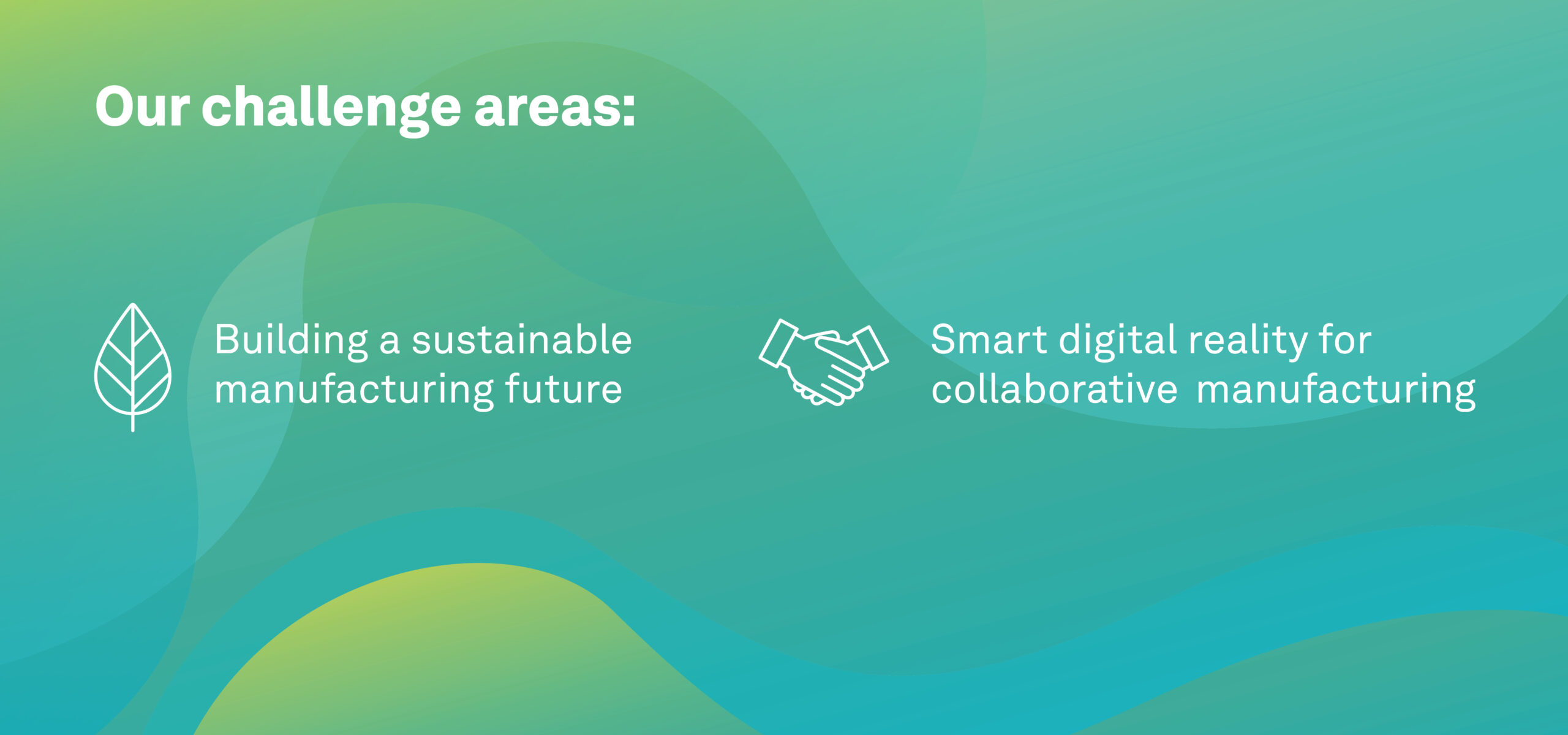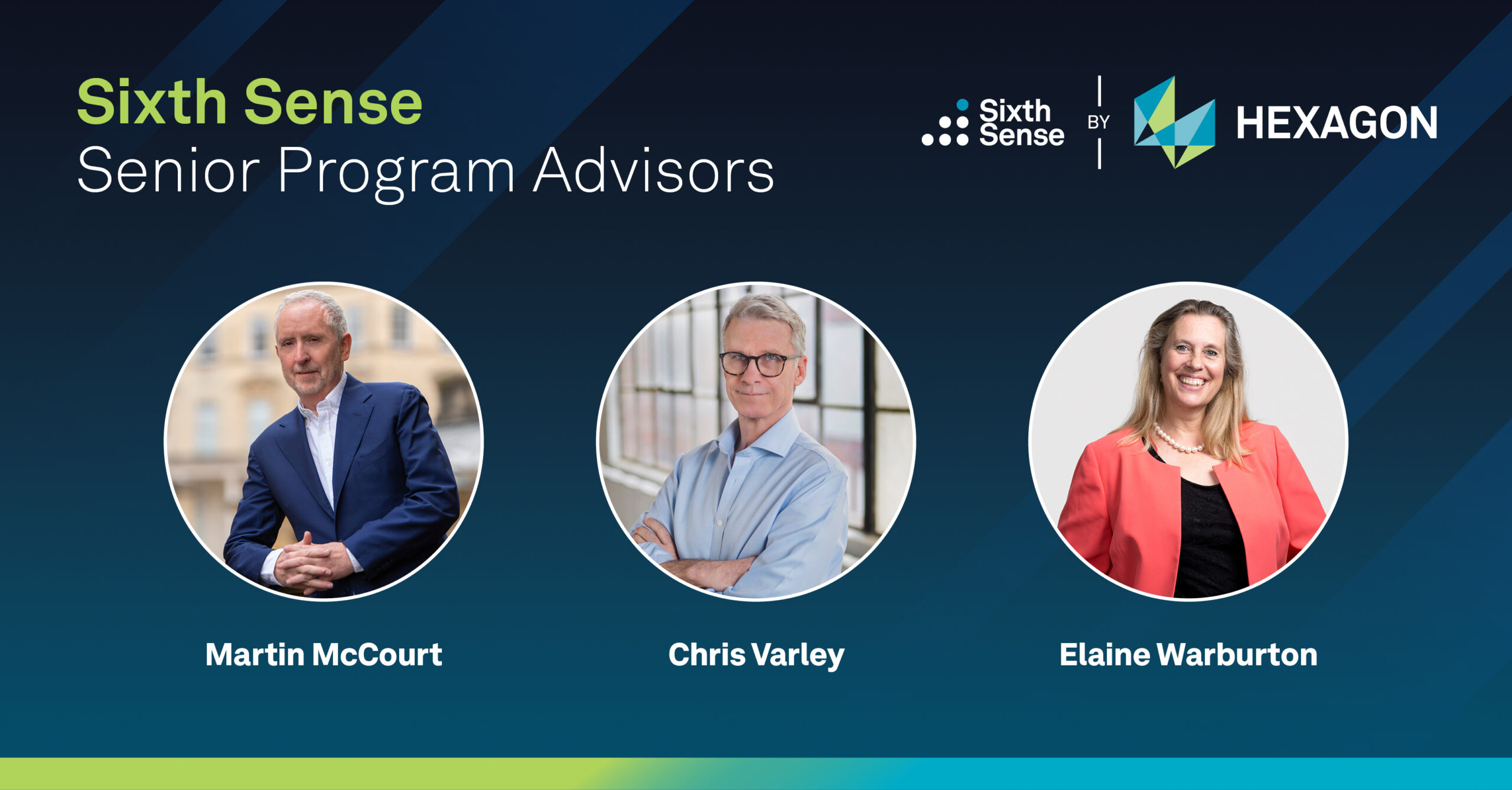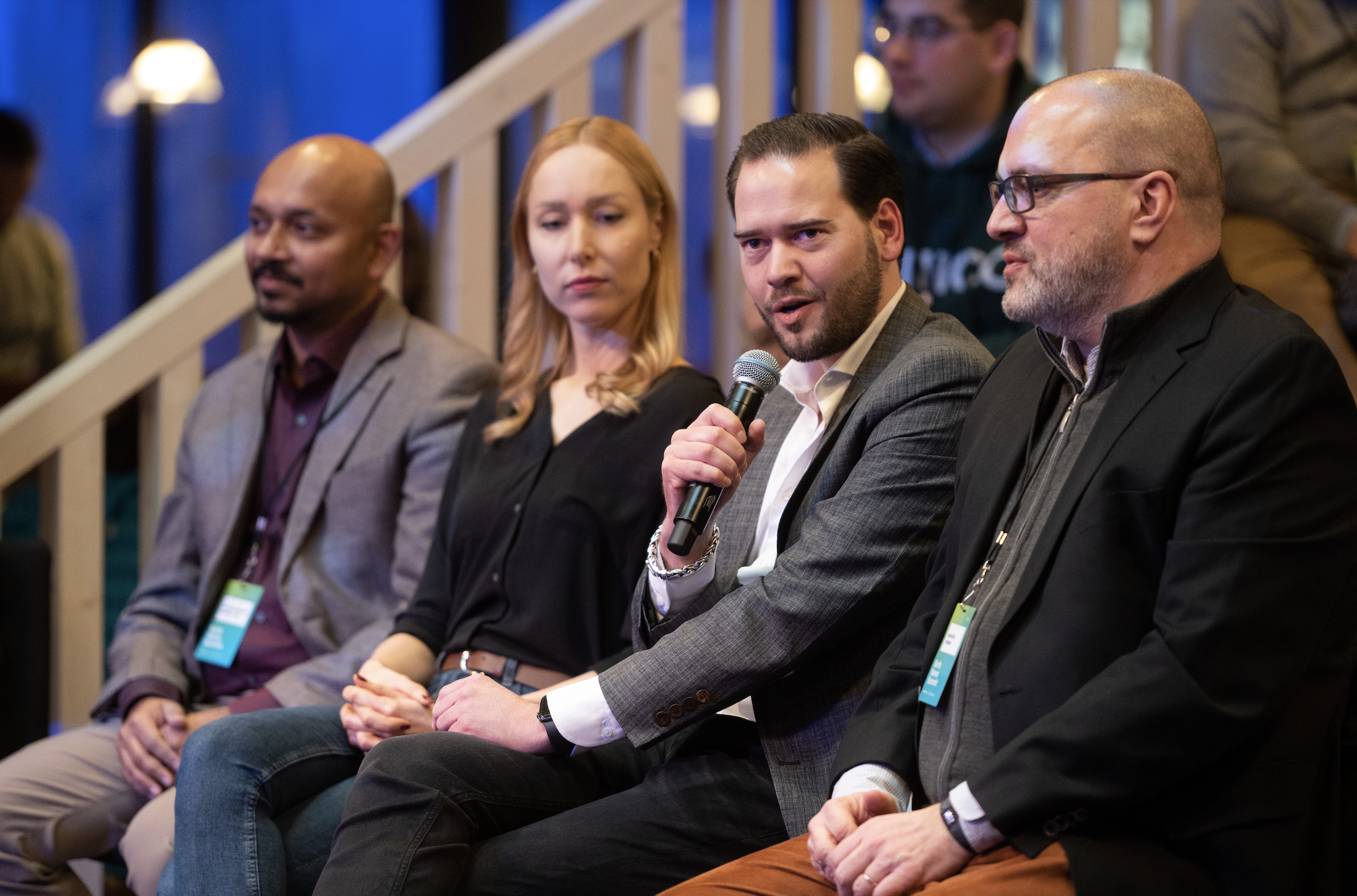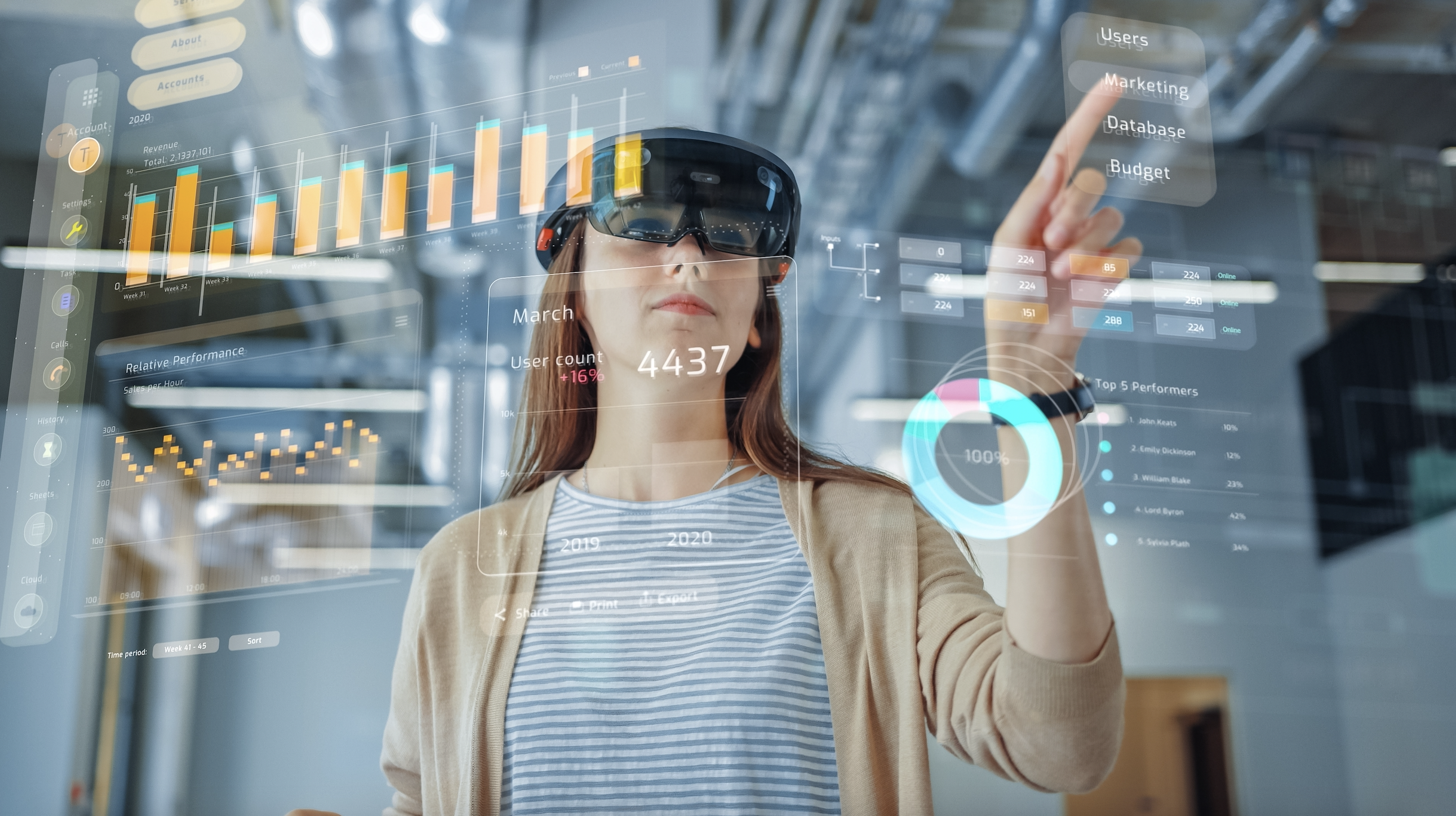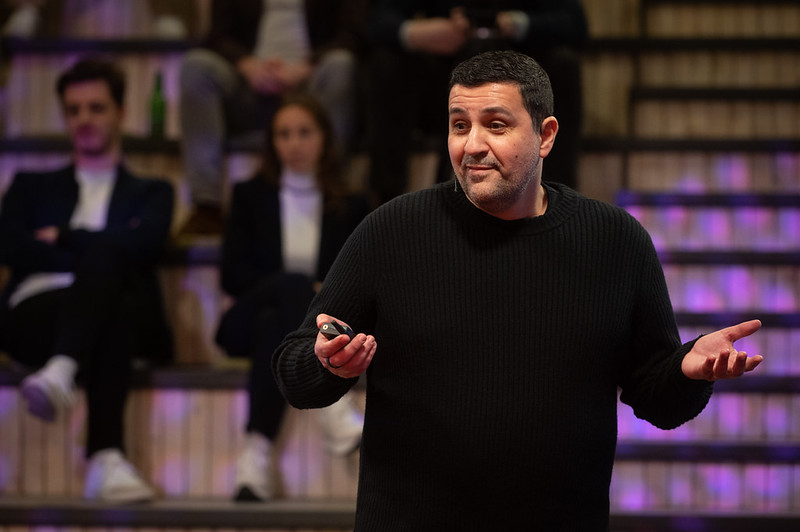Insights
Introducing our third challenge
We’re delighted to announce that the next Sixth Sense challenge has been revealed and we’re open to applications. Our next cohort will focus on two main themes: Building a sustainable manufacturing future Smart digital reality for collaborative manufacturing Read this blog to find out everything about the next challenge areas, who we’re looking for, and how you can apply. Who are we looking for? We’re looking for start-ups with a propensity for scale and a proven track record. They should be working on products for advanced manufacturing and have revenues of $3m or less, post-seed, Series A or A+. They will have been in operation for 1-5 years and have proven product market fit. Validation of investment from a third party and IP & licenses are not mandatory but will be an advantage. This is a global challenge, so we’re open to applications from anywhere across the world. We’re also particularly interested in diverse companies and encourage founders from underrepresented communities to apply. Sixth Sense is an innovate on the job scaling programme where ambitious start-ups can access Hexagon’s vast resources and connect with world class companies to solve some of humanity’s biggest challenges. When is it? The deadline for applications is 6 September and successful companies must be available for our selection day on 20 September. For those chosen to join the cohort, you’ll be taking part in a 10-week scaling programme culminating in a demo day on 6 December where the winners will be chosen. What are the challenge themes? Building a sustainable manufacturing future This theme encompasses decarbonisation, waste reduction, and resource preservation for sustainable product design. We might be talking about eco-design, materials innovation, circular economy, or product optimisation. Anything that accelerates manufacturing’s sustainable journey. Sustainability is a critical priority for Hexagon – it is a key driver of growth and tightly linked to our success as a company, and we are proud to call ourselves an enabler of sustainability. Regardless of whether companies operate within energy, transportation, construction, manufacturing, automotive or aerospace – any change must be sustainable. Focusing solely on improving competitiveness without consideration of environmental and social impacts is no longer an option. At Hexagon we are driving sustainable change with tangible impact and outcomes today. Our portfolio of digital reality solutions is making entire industries and nations more efficient, with significantly reduced emissions, minimised waste and improved safety for citizens and employees, every hour and every day. We know we can accelerate change if we work together with our ecosystem. That’s why we’re inviting start-ups to collaborate with us – if you’re working on something that could drive sustainability across the manufacturing product cycle – we want to hear from you. Smart digital reality for collaborative manufacturing This challenge area will explore how digital reality, Al, generative design, and NDT/NDE tools can optimise collaborative product design, virtual production simulation, analysis, and validation. This is an important area for us. Smart Digital Reality is Hexagon’s strategic advantage and the greatest source of value
Senior Program Advisors: Investors and Innovators join Sixth Sense’s team of industry experts
We are delighted to announce Martin McCourt, Elaine Warburton and Chris Varley as the first Sixth Sense Senior Program Advisors. Renowned in their respective fields, they will be an invaluable addition to the team, helping us to build new partnerships with the next generation of innovators, share knowledge and resources, and scale solutions that accelerate progress and push the boundaries of design, manufacturing and engineering. Over the coming months, Martin, Elaine and Chris will work closely with the Sixth Sense leadership team to help evolve the programme and identify how we can reach new partners and inspire diverse cohorts of startups to participate in future challenges. Senior Program Advisors will also participate in select events with each cohort to provide expert advice on scaling their business. Hexagon Manufacturing Intelligence designs solutions that empower an autonomous future. The Sixth Sense Senior Program Advisors' multidisciplinary expertise will support this mission. It will help Hexagon's Sixth Sense accelerate innovation by building deep connections with the broader global start-up ecosystem. Martin McCourt Martin McCourt was the CEO of Dyson for 15 years. As CEO, he devised and implemented a strategy that transformed the company from a single-product, single-market producer into one where 80% of the business came from over 60 markets. Martin was directly responsible for establishing Dyson subsidiaries in the USA, Japan, Switzerland, Austria and Germany. Currently, Martin holds non-executive positions in multiple companies in the manufacturing sector, such as e-bikes motors producer FreeFlow Technologies, the global leader in outdoor cooking Weber, and advanced machinery and robotics firm Tharsus. Martin says of joining the Sixth Sense advisory board: “Scaling up a business can be immensely rewarding as well as challenging. I have been working with inventors for many years and still get a great buzz from helping them to achieve their dreams. Working closely with the innovators selected by Sixth Sense promises to be a lot of fun”. Chris Varley Chris Varley has led new business and product creation efforts for several major corporations, including AT&T, CompuServe, Prentice-Hall, and The Walt Disney Company. In his current role as a Principal with Goodyear Ventures, Chris focuses on mobility and sustainability-related investments that enhance Goodyear's products and services. A two-term Generation Foundation Fellow for Sustainable Development and former Vice President of NorTech, the Northeast Ohio Technology Coalition, Chris played a critical role in the early development of the clean energy movement in Northeast Ohio. Chris says: “Sixth Sense has an impressive ability to connect early-stage startups with large organisations at the right time and with the right people. They enable innovators to work together in an atmosphere of trust and confidence, and I look forward to supporting that mission.” Elaine Warburton Elaine is an entrepreneur, innovator and investor who previously judged our first Sixth Sense cohort. With a background in healthcare, she also co-invented several innovative devices that are disrupting the diagnostics and digital health markets, driving the democratisation of healthcare. “I was privileged to judge the inaugural Sixth Sense cohort. As someone who loves
Unknown Group: What are impact investors looking for?
As an official partner of Sixth Sense, Unknown Group supports Sixth Sense with sourcing and reaching suitable start-ups across Europe. In February 2023, it hosted the inaugural Sixth Sense Summit. We spoke to chief commercial officer, Jeroen van den Bosch about all things impact investing… At Unknown, we are focused on fueling founders to fix the future. We’re called Unknown because we believe founders turn the world’s problems into opportunities by venturing beyond the known. The investments we make in early-stage companies range from manufacturing to energy, education, and food, but they all have one thing in common – these companies are pushing to have a positive impact on the way we lead our lives. When we talk about impact investing, we mean supporting purpose-driven founders that are trying to solve a problem that has a societal and environmental impact. The most powerful thing that attracts us to a portfolio company is the energy and commitment of the founder and the resourcefulness to transform that commitment into solutions. Preferably, they would fall into one of our four domains: energy transition, food transition, healthcare/well-being and education. As investors, we want to see some measurable impact KPIs around these topics. Impact investing has evolved There’s a difference between social enterprises and impact ventures. We are very much focused on the latter. These kinds of businesses have two purposes – they have the purpose of solving a problem, but in doing so, they also have the purpose of running a sustainable business. Profit might not be their sole purpose or biggest ambition, but we firmly believe that running a sustainable business increases the impact you can make. This is one way we believe impact investing has developed over the years. What started as a focus on investing in social enterprises has become much more focused on the impact for-profit businesses can make through their success. It makes our kind of investing similar to other VCs', but ROI is a logical consequence of the fact that we’re doing our work well, rather than the only goal for us. Manufacturing and impact: what’s the connection? We have a natural interest in the manufacturing space because the innovation that happens there is very cross-industry and has an impact far beyond a factory. In particular, we’re looking at how to optimize manufacturing, from the process itself to the people working on it. One example is our portfolio company, Skelex; they’ve built a skeleton that supports employees while doing overhead work. This empowers the workforce and enables people to surpass their potential while reducing the risk of injury. Finding the balance - measuring versus making an impact: If companies want to focus on impact, they need to back this up with data that measures and proves their approach is working. But something we have seen is that the more complex companies make this measurement, the harder it is to actually spend time making that impact. If companies create complex measuring models with 20 or 30 variables, the measuring
Moving towards Industry 5.0: putting humans at the heart of technology
Following a decade or so of heralding the 4th industrial revolution, it seems it’s time for a change in direction. This was certainly evident at last month’s Hannover Messe, the annual industrial trade fair – where talk of industry 5.0 was rife. This next phase of industrial revolution sees humans working alongside advanced technology and AI powered tools to enhance factory processes. This more human-centric focus is something Sixth Sense is particularly interested in. Joint winner of the last cohort, Castor, certainly agreed that it will become one of the biggest trends of the future. Telling us at the Sixth Sense Summit back in February, “We think the groundbreaking technologies are out there,” said Angeliki Malizou, Castor. What is needed are the tools that bring this to the fingertips of every engineer.” Sixth Sense’s Milan Kocic agrees. “My view of the innovation in our industry is that humans are going to be an integral part. Anyone who tells you otherwise doesn’t understand how manufacturing works. You can automate many processes but when you have out of the norm situations, humans need to be around.” While at Hannover Messe, Milan saw one company in particular that showed where industry might be heading: “I met a company called Rafinex from Luxembourg. They use AI and humans together to create regenerative design. So you ask Ai to design a component, it does loads of versions, then humans choose which ones to refine further. It’s an assistive process. I think by far the biggest revolution will be open AI assistance technology.” Bringing advanced technology to the masses To Castor’s point, and indeed evident at Hannover, the tools and the technology are there. It’s what we do with them next that matters. Part of this is ensuring people of all abilities can use them. In a world where skilled workforces are in high demand, democratising tools is essential if we are to bring everyone along on the journey. Milan gives the example of 3D printers. “Ten years ago everyone was talking about having 3D printers in every home. Then we realised you had to be a CAD engineer to use one. But thanks to AI, you can now simply ask it to design something for you. Because tools are maturing, you no longer need specialist skills – suddenly we have this boom in democratisation.” Sixth Sense was built around the idea that technologies, and indeed, humans, need to be working together to realise their potential. Now that democratisation is improving and we’re able to cast a wider net when it comes to finding the talent needed to operate tools, we turn to interoperability. Connecting technologies to realise potential “The technology and all of the components are there,” says Milan. “It's also very evident that people still don’t know exactly what to do with this it. What does it all mean and how does it fit together? There was a lot of visualisation and collaborative tools at Hannover – what I don’t think anyone showed was
GelSight: From inspiration to industrial use case
The inspiration from everyday life When MIT professor and neuroscientist Ted Adelson had his daughter, it changed his life far beyond the usual sleep deprivation. Professor Adelson, one of the world’s experts in human and machine vision, became obsessed with touch. “His whole career was about how human vision works and how you can tie that to computer vision,” explains GelSight CEO Youssef Benmokhtar. “But when his daughter was born he was actually fascinated by the fact that an infant relies on touch more than vision to explore the world in its first few weeks. It was an Isaac Newton moment. He decided to switch fields.” Adelson posed the question – is there way to build a sensor that is soft like a human finger and can capture touch signals with high sensitivity? “Now MIT is a place where things happen,” says Youssef. “Everyone said no, nothing like that exists today. So, he got to work in his garage and came up with the gel material that we use in our sensors.” With the skin-like sensitive gel created, Professor Adelson needed to transfer the data from the sensor. Given his history as an expert in vision, he decided to put a camera behind the gel, so the camera could see what the gel feels. “That’s how simple it is,” says Youssef, “It’s like having a camera inside your finger. That’s the genesis of the company.” Developing a product Spun out of MIT, GelSight’s tactile intelligence technology now digitises touch with human-like sensitivity. Most commonly used as a handheld device (but can also be mounted onto robotic arms), GelSight’s products have a soft, high-resolution, tactile sensor that conforms like human skin to the shape of an object on contact, precisely capturing the topography of the surface. “Wherever vision struggles or is not capable of giving you the understanding of the physical world, such as on a transparent surface or in bright or low light, GelSight provides you that understanding through touch,” says Youssef. Co-founder Kimo Johnson, who we also worked closely with during the Sixth Sense programme, took Professor Adelson’s sensor and created the algorithms behind it. “These allow you to create a 3D map of anything the sensor touches,” explains Youssef. When the innovative system was first invented, Professor Adelson was working on understanding how it could give robots the same sense of touch as humans. Would this enable them to start doing complex object manipulations? As the product progressed, it became clear that one of the best use cases for the invention was in surface inspection. Finding a real-world application “The fact that our device works in any environment, makes it a really good metrology device,” explains Youssef. “It’s accurate to the micron level – beyond millimetres and not quite nanometers.” This minute accuracy has meant that GelSight’s biggest customer base to date has been in the aerospace industry – searching for scratches and dents in the fuselage, wings, and airframes of aircraft. “Aerospace is a high precision industry,”
International Women’s Day: Female leaders at Hexagon have their say
On International Women’s Day we want to celebrate some of the amazing women working at Hexagon. Unfortunately the world of smart manufacturing is still heavily male-dominated. But we’re proud to say we have incredible female leaders driving our company forward and helping us to shape the future. Sixth Sense is a platform designed to bring the next generation of innovators to the table and we are constantly striving to create a gender balance within our cohort. By spotlighting our strong female role models, we hope to see a greater level of diversity as the industry progresses. So let’s hear from four of our colleagues about who inspired them, why it is so crucial to find that balance and how we might do it. Katherine Broder , Executive Vice President, Hexagon Geosystems Marion Rouzeaud, Global Sustainability Director Sarah Fordyce, Vice President, Brand Strategy Maria Luthstrom, President, Autonomy and Positioning division Name a woman in your industry who inspires you? Katherine: “Agata Fischer, who is VP of building solutions and president of building field solutions. I was able to mentor and be part of her development for over a decade now.” Marion: “Ellen MacArthur (even if not directly linked to the manufacturing industry). With her foundation, she promotes the transition to a circular economy which will become key for our manufacturing transformation. I am extremely inspired by her talks as I see direct applications of these concepts for Hexagon. I also admire her for her sense of purpose, being more a change maker than a businesswoman. Finally, I love the idea that you can diversify yourself in multiple career paths, in multiple versions of yourself, from being an athlete, an activist and a leader in the same lifetime.” Sarah: “Ann Lewnes – recently retired (after 16 years) EVP & CMO at Adobe. Under Ann’s leadership, Adobe pivoted to SasS and established an insight-driven culture.” Maria: “My Hexagon colleague Kalyn Sims, the CTO of Hexagon’s Safety, Infrastructure & Geospatial division is a great inspiration to all in STEM. Kalyn founded the tech company Denali Solutions, a leader in records management systems, which Hexagon acquired in 2011. Kalyn has a strong and inspiring story as an entrepreneur and mother, and she is someone who has inspired me since I joined Hexagon.” What do you think would encourage more women to get into smart manufacturing or other areas Hexagon covers? Katherine: “Knowing the women that are here and what we are doing – creating more awareness on how Hexagon is an inspiring and inclusive company.” Marion: “My first thoughts would be around education and representation. Encouraging girls to study STEM subjects in school to start developing an interest in technology. If you motivate them at a young age and propose these options in a more proactive way, women could at least have these career paths as options. I feel that today a lot of women are not even aware of these possibilities. “Secondly promote role models in tech or manufacturing to show what

